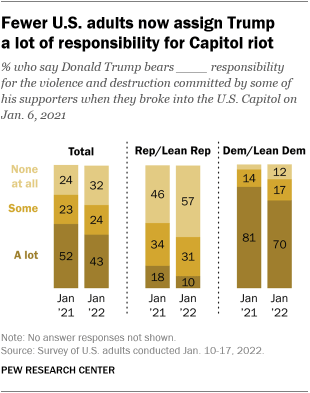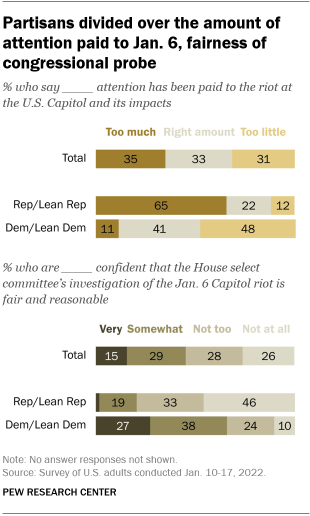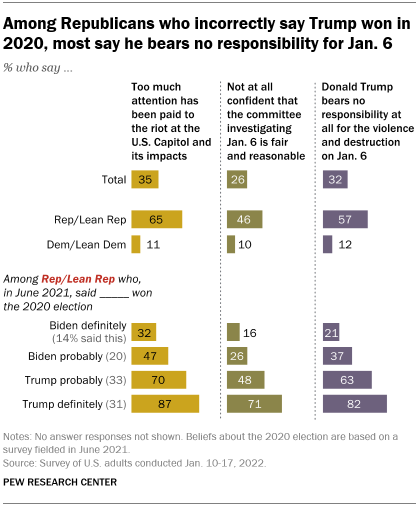A little more than a year after the Jan. 6 riot at the U.S. Capitol, Americans remain deeply divided about the events of that day and the ongoing congressional investigation into what happened.
Last year, in the immediate wake of Jan. 6, about half of U.S. adults (52%) said Donald Trump bore a lot of responsibility for the violence and destruction committed by some of his supporters that day. Today, 43% say this. The share of adults who say Trump bears some responsibility has changed little since then, but more Americans now say Trump bears no responsibility for the mayhem caused by his supporters that day (32% today vs. 24% then). The new survey was conducted Jan. 10-17, prior to several developments involving the Jan. 6 investigation and Trump’s actions following the 2020 election.
This survey examines Americans’ views about Jan. 6 riot at the U.S. Capitol and an ongoing House select committee’s investigation of the event. The survey was conducted Jan. 10-17, 2022, among 5,128 U.S. adults. Everyone who took part is a member of Pew Research Center’s American Trends Panel (ATP), an online survey panel that is recruited through national, random sampling of residential addresses. This way nearly all U.S. adults have a chance of selection. The survey is weighted to be representative of the U.S. adult population by gender, race, ethnicity, partisan affiliation, education and other categories. Read more about the ATP’s methodology.
Here are the questions used for the report, along with responses, and its methodology.
Among both Republicans and Democrats, there have been declines in the shares who say Trump bears responsibility for the violence and destruction at the Capitol. The share of Republicans and Republican-leaning independents who say he bears a lot of responsibility has declined from 18% a year ago to 10% today. Nearly six-in-ten Republicans (57%) currently say he has no responsibility at all for the violence, up from 46% shortly after the riot. Among Democrats and Democratic leaners, seven-in-ten say Trump bears a lot of responsibility for last year’s violence at the Capitol, down from 81% a year ago.
Views on the level of attention paid to the riot at the Capitol also continue to divide the public. A third of Americans say the right amount of attention has been paid to the events of Jan. 6, 2021, while about equal shares say the riot has received too much attention (35%) and too little attention (31%). These views are little changed from September 2021.
A large majority of Republicans (65%) say that there has been too much attention paid to the riot, with 22% saying it has received the right amount and just 12% saying it has received too little.
Among Democrats, about half (48%) say too little attention has been paid to the events of Jan. 6, while 41% say the amount of attention has been about right and just 11% say it has received too much attention.
The share of Americans who have heard about the congressional investigation into the events of Jan. 6 has increased since September. Currently, 26% say they have heard a lot about the House select committee’s investigation, up from just 11% then. Comparable shares in both parties (29% of Democrats and 25% of Republicans) have heard a lot about the committee’s probe.
Partisans have widely differing levels of confidence in the fairness of the select committee. Overall, 45% of Americans say they are at least somewhat confident that the committee’s investigation is fair and reasonable, while 54% say they are not too or not at all confident that this is the case.
Nearly eight-in-ten Republicans (79%) say they have little or no confidence in the fairness of the Jan. 6 committee’s investigation, including about half (46%) who say they have no confidence at all.
Democrats’ confidence in the committee’s fairness is more equivocal. About two-thirds of Democrats (65%) say they are at least somewhat confident that the investigation is fair and reasonable, with 27% saying they are very confident.
Republicans are internally divided in their views of the Jan. 6 riot, including Trump’s role in it, depending on whether they believe Trump or Joe Biden was the rightful winner of the 2020 election. In a June 2021 survey, about two-thirds of Republicans said Trump definitely (33%) or probably (33%) won the 2020 presidential election – meaning they believe he received the most votes cast by eligible voters in enough states to win.
Republicans who hold this view – incorrectly – overwhelmingly absolve him from responsibility for the Jan. 6 riot and say too much attention has been paid to the event. These Republicans also doubt the fairness of the congressional investigation.
The smaller share of Republicans (34%) who say Biden definitely or probably won the election are less likely to express these views. For example, just 31% of Republicans who say Biden definitely or probably was the rightful winner of the presidential election say Trump bears no responsibility for the violence and destruction at the Capitol; that compares with 72% among those who contend that Trump definitely or probably won.
Note: Here are the questions used for the report, along with responses, and its methodology.



